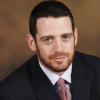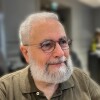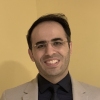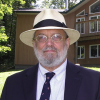Writing Fellows
Aymenn Jawad Al-Tamimi, a Milstein Writing Fellow at the Middle East Forum, is an independent Arabic translator, editor, and analyst. A graduate of Brasenose College, Oxford University, he earned his Ph.D. from Swansea University, where he studied the role of historical narratives in Islamic State propaganda. His research focuses primarily on Iraq, Syria, and jihadist groups, especially the Islamic State, on which he maintains an archive of the group’s internal documents. He has also published an Arabic translation and study of the Latin work Historia Arabum, the earliest surviving Western book focused on Arab and Islamic history. For his insights, he has been quoted in a wide variety of media outlets, including the New York Times, the Wall Street Journal, and AFP.
Arun Anand is a columnist, author, and broadcaster who writes extensively on Islamic radicalization. He has authored books on the Taliban and Islamic radicalization in India. With more than three decades of experience, he has held senior editorial positions at leading Indian media groups.
Amine Ayoub is a policy analyst and writer based in Morocco. His media contributions appeared in The Jerusalem Post, Yedioth Ahronoth , Arutz Sheva ,The Times of Israel and many others. His writings focus on Islamism, jihad, Israel and MENA politics. He tweets at @amineayoubx.
Amatzia Baram is a professor emeritus of Middle East history at University of Haifa. During his tenure there, he served as chairman of the Department of Middle East History, director of the Jewish-Arab Center and the Institute for Middle East Studies, and founder and head of the Center for Iraq Studies. He advised the U.S. government on Iraq under Presidents Reagan, Bush, Clinton, Bush, and Obama. Baram has published six books, some 80 articles in academic journals, and numerous articles in newspapers such as the New York Times and the Washington Post. Presently, he is a regular contributor to Geopolitical Intelligence Services (GIS), published by Prince Michael of Liechtenstein.
Rafael Bardaji is executive director of Friends of Israel Initiative. He served in 1996-2004 as Spain’s National Security Advisor for Prime Minister Jose’ Mari’a Aznar. He is an advisor to the Special Operation Forces HQ at NATO and since 2004 has worked as director of Foreign Policy at the Foundation for Analysis and Social Studies. Mr. Bardaji has provided consultancy work for NATO military commands, the Spanish armed forces, the Spanish intelligence service and defense contractors. A member of the Atlantic Council of the United States Strategic Advisory Group, he is the author of books and articles. Follow Rafael Bardaji on Twitter @@rafael_bardaji
Lazar Berman is the diplomatic correspondent at the Times of Israel, where he also covers Christian Affairs. He holds an M.A. in Security Studies from Georgetown University and taught at Salahuddin University in Iraqi Kurdistan. Berman is a reserve captain in the IDF’s Commando Brigade and served in a Bedouin unit during his active service.
Abdullah Bozkurt is a Swedish-based investigative journalist and analyst who runs the Nordic Research and Monitoring Network. He also serves on the advisory board of The Investigative Journal and as chairman of the Stockholm Center for Freedom. Bozkurt is the author of the book Turkey Interrupted: Derailing Democracy (2015). He previously worked as a journalist in New York, Washington, Istanbul and Ankara. He tweets at @abdbozkurt.
A.J. Caschetta is a principal lecturer at the Rochester Institute of Technology. He holds a Ph.D. from New York University, where he studied the effects of the French Revolution and Reign of Terror on British society. After 9/11, he began focusing on the rhetoric of radical Islamists and on Western academic narratives explaining Islamist terrorism. He has written frequently for the Middle East Quarterly.
An analyst of gender issues in the Middle East, a psychotherapist and a feminist, Phyllis Chesler co-founded the Association for Women in Psychology in 1969, the National Women’s Health Network in 1975, and is emerita professor of psychology at The City University of New York. She has published 15 books, most recently An American Bride in Kabul (2013) which won the National Jewish Book Award for 2013. Chesler’s articles have appeared in numerous publications, including the Middle East Quarterly, Encyclopedia Judaica, International Herald Tribune, National Review, New York Times, Times of London, Washington Post and Weekly Standard. Based on her studies about honor killings among Muslims and Hindus, she has served as an expert courtroom witness for women facing honor-based violence. Her works have been translated into 13 languages. Follow Phyllis Chesler on Twitter @Phyllischesler
Dr. Craig Considine is a Senior Lecturer in Sociology at Rice University. He is known for his contributions to interfaith dialogue and is currently focusing on topics like the Abraham Accords and the Marxist–Islamist alliance. Dr. Considine’s acclaimed scholarly work includes The Humanity of Muhammad – A Christian View (Blue Dome Press, 2020) and People of the Book – Prophet Muhammad’s Encounters with Christians (Hurst/Oxford University Press, 2021). A sought-after speaker, Dr. Considine has addressed audiences at various universities, conferences, and community events worldwide, including Oxford University, New York University (Abu Dhabi), the Forum for Promoting Peace in Muslim Societies (Abu Dhabi), the University of Edinburgh, and Hamad Bin Khalifa University (Doha). Considine has also been featured in numerous news media outlets and regularly engages with the press. He holds a PhD in sociology from Trinity College Dublin, an MSc in international relations from Royal Holloway – University of London, and a BA in international relations from American University. His latest book – Beyond Dialogue – Building Bonds Between Christians and Muslims (Polity Press) – was published in November 2024.
Yuval David is a leader in Israeli, American, and international Jewish communities, focusing on Zionist, LGBTQ, civil rights, and social justice causes. He advises over 40 organizations as a keynote speaker, consultant, and content creator; advocates with political leaders in the U.S., Israel, and abroad; and speaks at events across the U.S., Canada, and Israel. Recognized as the #1 “Young ViZionary” by the Jerusalem Post and Jewish National Fund USA, a “Hero Against Hate” by the ADL, a World Zionist Congress delegate, a Voice of the People council member under Israel’s President Herzog, a Middle East Forum fellow, and an advisor to U.S. and Israeli politicians, David is also an Emmy Award-winning journalist, actor, and filmmaker who comments on broadcasts and writes for outlets like the Jerusalem Post, Times of Israel, The Hill, and Out Magazine.
A theologian, human rights activist and Anglican pastor, Rev. Mark Durie has published on linguistics, Christian-Muslim relations, the Qur’an, the Islamic Sharia and religious freedom. He holds a Ph.D. in Linguistics from the Australian National University and a Th.D. from the Australian College of Theology. Durie, who has addressed the Middle East Forum, has held visiting appointments at the University of Leiden, MIT, UCLA and Stanford, was elected a Fellow of the Australian Academy of the Humanities in 1992, and was awarded an Australian Centennial Medal in 2001. He is a Senior Research Fellow at the Arthur Jeffery Centre of the Melbourne School of Theology, and Founding Director of the Institute for Spiritual Awareness. Follow Mark Durie on Twitter @markdurie
Joe Adam George is the research lead for Islamist threats in Canada at the Middle East Forum. Based in Ottawa, he is also a foreign policy and national security analyst with the Macdonald-Laurier Institute, covering Islamist extremism in the West, terror financing, and geopolitical developments in the Middle East and South Asia and their impact on Canada and the U.S. Joe previously worked in the Parliament of Canada as press secretary and advisor to the leader of the opposition party, and as a research intern at the Hudson Institute’s Center for Political-Military Analysis. His work has been featured in the National Post, The Globe and Mail, The Hill Times, The Hill, Real Clear World, The Times of India, and The Economic Times.
Saeid Golkar is an associate professor at the University of Tennessee at Chattanooga’s Department of Political Science and a senior advisor at United Against Nuclear Iran.
A scholar of European Islamism, Turkey, and the Arab-Israeli conflict, Michel Gurfinkiel is founder and president of the Jean-Jacques Rousseau Institute, a Paris-based think tank, and a former editor-in-chief of Valeurs Actuelles, France’s foremost conservative weekly magazine. A French national, he studied history and semitics at the Sorbonne and the French National Institute for Oriental Languages and Civilizations. Gurfinkiel is author of eight books and a frequent contributor to American media, including the Middle East Quarterly, Commentary, PJMedia, Wall Street Journal, and Weekly Standard.
Zvi Hauser is an Israeli national security expert. A key figure in the Israeli public sector, he is also an an entrepreneur and strategic advisor. Hauser was the sixteenth cabinet secretary of Israel. Formerly deputy speaker of the Knesset, he was chairman of the Foreign Affairs and Defense Committee. Hauser is an adjunct professor from Shizenken University, Tokyo, and earned an LL.B. degree from Tel Aviv University.
Raymond Ibrahim, a specialist in Islamic history and doctrine, is the author of Defenders of the West: The Christian Heroes Who Stood Against Islam (2022); Sword and Scimitar: Fourteen Centuries of War between Islam and the West (2018); Crucified Again: Exposing Islam’s New War on Christians (2013); and The Al Qaeda Reader (2007). He has appeared on C-SPAN, Al-Jazeera, CNN, NPR, and PBS and has been published by the New York Times Syndicate, the Los Angeles Times, the Washington Post, the Financial Times, the Weekly Standard, the Chronicle of Higher Education, and Jane’s Islamic Affairs Analyst. Formerly an Arabic linguist at the Library of Congress, Ibrahim guest lectures at universities, briefs governmental agencies, and testifies before Congress. He has been a visiting fellow/scholar at a variety of Institutes—from the Hoover Institution to the National Intelligence University—and is the Judith Friedman Rosen Fellow at the Middle East Forum and the Distinguished Senior Shillman Fellow at the Gatestone Institute.
Sirwan Kajjo is a journalist and researcher specializing in Kurdish politics, Islamic militancy, and Syrian affairs. He has contributed two book chapters on Syria and the Kurds, published by Indiana University Press and Cambridge University Press. His writings on Syrian and Kurdish issues have appeared in the Middle East Forum, the Washington Institute for Near East Policy, and other prominent think tanks and publications. Kajjo is also the author of Nothing But Soot, a novel set in Syria. He holds a BA in government and international politics from George Mason University.
Efraim Karsh is an emeritus professor of Middle East and Mediterranean studies at King’s College London. Mr. Karsh held academic posts at Harvard, Columbia, and Bar-Ilan universities, the Sorbonne, the London School of Economics, Helsinki University, the International Institute for Strategic Studies in London, the Kennan Institute for Advanced Russian Studies in Washington, D.C., and the Jaffee Center for Strategic Studies at Tel Aviv University. He is the author of sixteen books and over 100 scholarly articles and has appeared frequently as a commentator on British and American television networks.
Naser Khader is a Danish politician, academic, author, defender of free speech, and opponent of Islamism. Of Syrian-Palestinian origins, he has been a member of the Danish parliament since 2001-2022 (with a break in the years 2011-2015). He has a B.A. in Middle East studies from the University of Southern Denmark; an M.A. in economics and political science from Copenhagen University; and an M.A. in Christian theology from Copenhagen University. A senior fellow at the Hudson Institute from 2011-15, he chaired the Danish parliament’s Defence Committee from 2016-21. Khader has published nine books and hundreds of articles in Danish, English, and Arabic.
Brigadier General (Res) Yossi Kuperwasser - former head of the research division at the IDF Intelligence corps, fellow at the Jerusalem Center for Security and Foreign Affairs’ a fellow at Misgav Institute and a member of the Israeli Defense and Security Forum (IDSF).
Hussein Aboubakr Mansour is an Egyptian-American analyst who focuses on such topics as Muslim antisemitism, Islamist ideology, and American universities. He grew up in his native Cairo, Egypt, where he was attracted to Salafist mosques at an early age and fascinated by antisemitic conspiracy theories in Egyptian popular culture. After a transformative educational journey, he pushed back against antisemitism, which got him into trouble with the Egyptian authorities. Mansour has been published in Commentary, Tablet, The Hill, Mosaic, and elsewhere, and has published an autobiography, Minority of One: The Unchaining of an Arab Mind. Today he writes often at his Substack, The Abrahamic Critique and Digest. He received political asylum in the United States in 2012 and worked as an assistant professor of Hebrew language at the Defense Language Institute. He holds an MA in International Affairs from George Washington University.
Giulio Meotti is a Rome-based journalist for Il Foglio national newspaper. He is the author of twenty books, including A New Shoah: The Untold Story of Israel’s Victims of Terrorism, The Last Western Pope (translated into Spanish and Polish), The End of Europe (Prize Capri San Michele), and The Sweet Conquest (with a preface by Algerian novelist Boualem Sansal) about the creeping Islamization of Europe. He writes a weekly column for Arutz Sheva and has contributed to the Wall Street Journal, the Jerusalem Post, Gatestone Institute, and Die Weltwoche.
Alireza Nader is a widely recognized expert on Iran and U.S. policy in the Middle East. As a former senior researcher at the RAND Corporation and a senior fellow at FDD, he authored numerous reports and studies on Iran, the Middle East, and U.S. strategy.
Eric Navarro, director of Military and Strategy Programs at the Forum, is a seasoned military officer, business leader, and national security strategist. A Lieutenant Colonel in the Marine Corps Reserves (recently selected to Colonel), Mr. Navarro served two combat tours in Iraq and has led countless training evolutions, technology initiatives, and real-world operations around the globe. Mr. Navarro has an MBA from NYU’s Stern School of Business and an M.S. in National Security Strategy from National War College. He is also the author of a book, titled God Willing, detailing his experience as one of the first imbedded advisors to the New Iraqi Army. He is a frequent media contributor with articles and appearances focused on national security strategy and the use of American power in a contested geopolitical environment.

Abhinav Pandya
Writing Fellow
Abhinav Pandya is the founder and chief executive officer of the Usanas Foundation, an Indian foreign policy and security think tank.
Loqman Radpey is a Middle East Forum fellow, and the author of Towards an Independent Kurdistan: Self-Determination in International Law.
Karys Rhea is a producer at the Epoch Times, a writing fellow with the Middle East Forum, a delegate for Israel365 Action, and a Rising Leader at the Global Liberty Institute. You can find her on X @rheakarys.
Asaf Romirowsky is the executive director of Scholars for Peace in the Middle East (SPME) and an affiliate professor at the University of Haifa. Trained as a historian, he holds a Ph.D. in Middle East and Mediterranean Studies from King’s College London and has published widely on various aspects of the Arab-Israeli conflict and American foreign policy in the Middle East, as well as on Israeli and Zionist history.
Philip Carl Salzman is Emeritus Professor of Anthropology at McGill University and past president of Scholars for Peace in the Middle East. He is the author of Culture and Conflict in the Middle East (2008), a book that Stanley Kurtz called “the most penetrating, reliable, systematic, and theoretically sophisticated effort yet made to understand the Islamist challenge the United States is facing in cultural terms.” His other works on the Middle East include Black Tents of Baluchistan (2000), Pastoralists: Equality, Hierarchy, and the State (2004), and Postcolonial Theory and the Arab-Israel Conflict (edited with D. R. Divine, 2008). He is a member of the Academic Board of the Canadian Institute for Jewish Research, as well as a member of the editorial boards of six academic journals about the Middle East and Central Asia.
Elizabeth Samson is an international lawyer, an Adjunct Professor of Political Science at Queens College-CUNY, a Writing Fellow at the Middle East Forum, and a former Visiting Fellow at the Hudson Institute. She holds a J.D. from Fordham Law School and an LL.M. in International & European Law from the University of Amsterdam. Ms. Samson speaks globally on topics of law and human rights, specializing in international law and constitutional law. She has authored several peer-reviewed legal publications on topics of comparative international law and humanitarian law. Her writings appear in the New York Times, Wall Street Journal, The Guardian, the Washington Times, the New York Post, and other publications.
Joseph Morrison Skelly specializes in international terrorism, diplomatic history, military affairs, and the contemporary Middle East. His books include Ideas Matter: Essays in Honour of Conor Cruise O’Brien (1998), Political Islam from Muhammad to Ahmadinejad: Defenders, Detractors, and Definitions (2010). Skelly is an officer in the United States Army Reserve, where he served a tour of duty in Operation Iraqi Freedom. He currently serves as the Executive Officer of the 405th Field Hospital, a unit of more than 400 soldiers prepared to respond to military contingencies worldwide. He is a 2015 recipient of the United States Army’s General Douglas MacArthur Leadership Award. Skelly is a professor of History and Chair of the Department of History at the College of Mount Saint Vincent and a fellow at the Middle East Forum.
Jonathan Spyer oversees the Forum’s content and is editor of the Middle East Quarterly. Mr. Spyer, a journalist, reports for Janes Intelligence Review, writes a column for the Jerusalem Post, and is a contributor to the Wall Street Journal and The Australian. He frequently reports from Syria and Iraq. He has a B.A. from the London School of Economics, an M.A. from the School of Oriental and African Studies in London, and a Ph.D. from the London School of Economics. He is the author of two books: The Transforming Fire: The Rise of the Israel-Islamist Conflict (2010) and Days of the Fall: A Reporter’s Journey in the Syria and Iraq Wars (2017).
An expert on Middle Eastern cultural and political affairs, Raymond Stock lived in Cairo for 20 years (1990-2010). He has translated seven books by Egyptian Nobel laureate in literature Naguib Mahfouz, whose biography he is presently writing for Farrar, Straus & Giroux. He was denied re-entry and deported from Egypt by the Mubarak regime in December 2010 due to his Foreign Policy magazine article criticizing the bid by the explicitly anti-Semitic culture minister Farouk Hosni to head UNESCO. A former Guggenheim Fellow, with a Ph.D. in Near Eastern Languages and Civilizations (including ancient through modern studies) from the University of Pennsylvania, he has taught Arabic and Middle East Studies as a Visiting Assistant Professor at Drew University. A frequent commentator in the media, his articles and translations of Arabic fiction have appeared in the Middle East Quarterly, Bookforum, The Financial Times, Foxnews.com, Foreign Policy Research Institute E-Notes, Harper’s Magazine, International Herald Tribune, London Magazine, PJMedia and many other venues.
Babak Taghvaee is a defense and security journalist, researcher, historian, and book author based in Europe. With over 16 years of experience, he specializes in defense and security topics for various prestigious international publications. As an OSINT (Open Source Intelligence) expert, he has written hundreds of evidence-based reports and articles for news media such as Radio Free Europe, Israel Hayom, and the BBC.
Benjamin Weinthal is an investigative journalist and a Writing Fellow at the Middle East Forum. He is based in Jerusalem and reports on the Middle East for Fox News Digital and the Jerusalem Post. He earned his B.A. from New York University and holds a M.Phil. from the University of Cambridge. Weinthal’s commentary has appeared in the Wall Street Journal, Haaretz, the Guardian, Politico, the New York Daily News, the New York Post, Ynet and many additional North American and European outlets. His 2011 Guardian article on the Arab revolt in Egypt, co-authored with Eric Lee, was published in the book The Arab Spring (2012).
Burak Bekdil was an Ankara-based Turkish columnist for Hurriyet Daily News. He covered Turkey for the U.S. weekly Defense News since 1997. Previously, Bekdil worked as Ankara Bureau Chief for Dow Jones Newswires and CNBC-e television. He was frequently quoted in international media outlets, including the Wall Street Journal, Economist, Los Angeles Times, and New York Times.
Tarek S. Fatah was founder of the Muslim Canadian Congress, a group committed to fighting Islamism and promoting the separation between religion and state. He was a columnist at the Toronto Sun and host of a Sunday afternoon talk show on Toronto’s NewsTalk1010 AM Radio. Fatah was the author of two award-winning books: Chasing a Mirage: The Tragic Illusion of an Islamic State and The Jew is Not My Enemy: Unveiling the Myths that Fuel Muslim Anti-Semitism.
MEF Writing Fellows policy is available by clicking here.














































